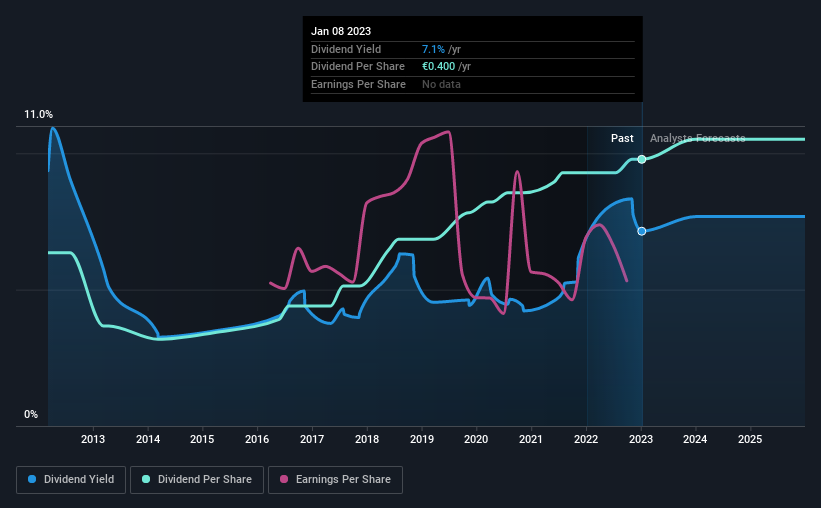
Enel SpA (BIT:ENEL) has announced that it will be increasing its dividend from last year's comparable payment on the 25th of January to €0.20. This makes the dividend yield 7.1%, which is above the industry average.
While the dividend yield is important for income investors, it is also important to consider any large share price moves, as this will generally outweigh any gains from distributions. Investors will be pleased to see that Enel's stock price has increased by 34% in the last 3 months, which is good for shareholders and can also explain a decrease in the dividend yield.
See our latest analysis for Enel
Enel's Dividend Is Well Covered By Earnings
Impressive dividend yields are good, but this doesn't matter much if the payments can't be sustained. Based on the last payment, earnings were actually smaller than the dividend, and the company was actually spending more cash than it was making. Paying out such a large dividend compared to earnings while also not generating any free cash flow would definitely be difficult to keep up.
The next year is set to see EPS grow by 158.9%. If the dividend continues along recent trends, we estimate the payout ratio will be 70%, which would make us comfortable with the sustainability of the dividend, despite the levels currently being quite high.

Dividend Volatility
While the company has been paying a dividend for a long time, it has cut the dividend at least once in the last 10 years. Since 2013, the dividend has gone from €0.26 total annually to €0.40. This means that it has been growing its distributions at 4.4% per annum over that time. The dividend has seen some fluctuations in the past, so even though the dividend was raised this year, we should remember that it has been cut in the past.
Enel May Find It Hard To Grow The Dividend
Given that the dividend has been cut in the past, we need to check if earnings are growing and if that might lead to stronger dividends in the future. However, Enel's EPS was effectively flat over the past five years, which could stop the company from paying more every year. The earnings growth is anaemic, and the company is paying out 161% of its profit. This gives limited room for the company to raise the dividend in the future.
The Dividend Could Prove To Be Unreliable
In summary, while it's always good to see the dividend being raised, we don't think Enel's payments are rock solid. The payments are bit high to be considered sustainable, and the track record isn't the best. We would be a touch cautious of relying on this stock primarily for the dividend income.
Investors generally tend to favour companies with a consistent, stable dividend policy as opposed to those operating an irregular one. At the same time, there are other factors our readers should be conscious of before pouring capital into a stock. Just as an example, we've come across 4 warning signs for Enel you should be aware of, and 2 of them don't sit too well with us. Looking for more high-yielding dividend ideas? Try our collection of strong dividend payers.
Valuation is complex, but we're here to simplify it.
Discover if Enel might be undervalued or overvalued with our detailed analysis, featuring fair value estimates, potential risks, dividends, insider trades, and its financial condition.
Access Free AnalysisHave feedback on this article? Concerned about the content? Get in touch with us directly. Alternatively, email editorial-team (at) simplywallst.com.
This article by Simply Wall St is general in nature. We provide commentary based on historical data and analyst forecasts only using an unbiased methodology and our articles are not intended to be financial advice. It does not constitute a recommendation to buy or sell any stock, and does not take account of your objectives, or your financial situation. We aim to bring you long-term focused analysis driven by fundamental data. Note that our analysis may not factor in the latest price-sensitive company announcements or qualitative material. Simply Wall St has no position in any stocks mentioned.
About BIT:ENEL
Enel
Operates as an integrated operator in electricity and gas industries worldwide.
Solid track record established dividend payer.
Similar Companies
Market Insights
Community Narratives



